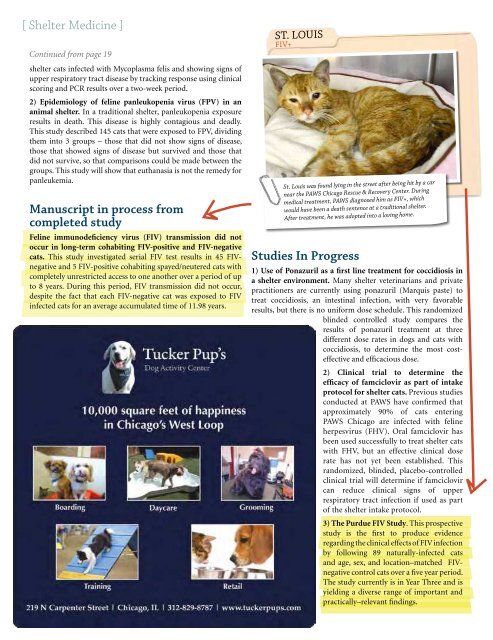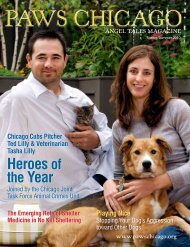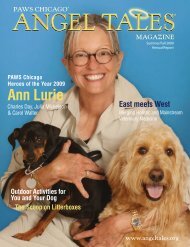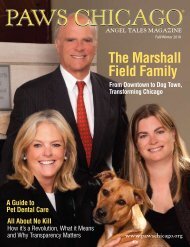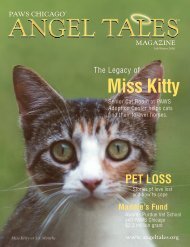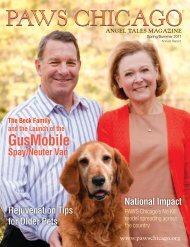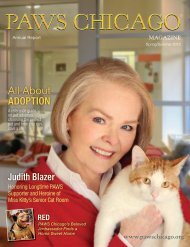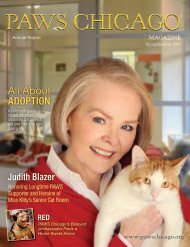DAVID DUFFIELD - PAWS Chicago
DAVID DUFFIELD - PAWS Chicago
DAVID DUFFIELD - PAWS Chicago
Create successful ePaper yourself
Turn your PDF publications into a flip-book with our unique Google optimized e-Paper software.
[ Shelter Medicine ]<br />
Continued from page 19<br />
shelter cats infected with Mycoplasma felis and showing signs of<br />
upper respiratory tract disease by tracking response using clinical<br />
scoring and PCR results over a two-week period.<br />
2) Epidemiology of feline panleukopenia virus (FPV) in an<br />
animal shelter. In a traditional shelter, panleukopenia exposure<br />
results in death. This disease is highly contagious and deadly.<br />
This study described 145 cats that were exposed to FPV, dividing<br />
them into 3 groups – those that did not show signs of disease,<br />
those that showed signs of disease but survived and those that<br />
did not survive, so that comparisons could be made between the<br />
groups. This study will show that euthanasia is not the remedy for<br />
panleukemia.<br />
Manuscript in process from<br />
completed study<br />
Feline immunodeficiency virus (FIV) transmission did not<br />
occur in long-term cohabiting FIV-positive and FIV-negative<br />
cats. This study investigated serial FIV test results in 45 FIVnegative<br />
and 5 FIV-positive cohabiting spayed/neutered cats with<br />
completely unrestricted access to one another over a period of up<br />
to 8 years. During this period, FIV transmission did not occur,<br />
despite the fact that each FIV-negative cat was exposed to FIV<br />
infected cats for an average accumulated time of 11.98 years.<br />
ST. LOUIS<br />
FIV+<br />
St. Louis was found lying in the street after being hit by a car<br />
near the <strong>PAWS</strong> <strong>Chicago</strong> Rescue & Recovery Center. During<br />
medical treatment, <strong>PAWS</strong> diagnosed him as FIV+, which<br />
would have been a death sentence at a traditional shelter.<br />
After treatment, he was adopted into a loving home.<br />
Studies In Progress<br />
1) Use of Ponazuril as a first line treatment for coccidiosis in<br />
a shelter environment. Many shelter veterinarians and private<br />
practitioners are currently using ponazuril (Marquis paste) to<br />
treat coccidiosis, an intestinal infection, with very favorable<br />
results, but there is no uniform dose schedule. This randomized<br />
blinded controlled study compares the<br />
results of ponazuril treatment at three<br />
different dose rates in dogs and cats with<br />
coccidiosis, to determine the most costeffective<br />
and efficacious dose.<br />
2) Clinical trial to determine the<br />
efficacy of famciclovir as part of intake<br />
protocol for shelter cats. Previous studies<br />
conducted at <strong>PAWS</strong> have confirmed that<br />
approximately 90% of cats entering<br />
<strong>PAWS</strong> <strong>Chicago</strong> are infected with feline<br />
herpesvirus (FHV). Oral famciclovir has<br />
been used successfully to treat shelter cats<br />
with FHV, but an effective clinical dose<br />
rate has not yet been established. This<br />
randomized, blinded, placebo-controlled<br />
clinical trial will determine if famciclovir<br />
can reduce clinical signs of upper<br />
respiratory tract infection if used as part<br />
of the shelter intake protocol.<br />
3) The Purdue FIV Study. This prospective<br />
study is the first to produce evidence<br />
regarding the clinical effects of FIV infection<br />
by following 89 naturally-infected cats<br />
and age, sex, and location–matched FIVnegative<br />
control cats over a five year period.<br />
The study currently is in Year Three and is<br />
yielding a diverse range of important and<br />
practically–relevant findings.<br />
Inspiring the Future Generation of<br />
Veterinary Medicine<br />
<strong>PAWS</strong> <strong>Chicago</strong> regularly welcomes people and organizations from across the nation, and<br />
around the world, to visit and learn about <strong>PAWS</strong> <strong>Chicago</strong>’s No Kill model. <strong>PAWS</strong> works<br />
with Purdue University to host existing and aspiring veterinarians to learn more about the<br />
field of shelter medicine. In addition to hosting annual shelter medicine symposiums, Vet<br />
Camp and SAVMA Conference came to <strong>PAWS</strong> <strong>Chicago</strong> during the summer months.<br />
SAVMA Conference<br />
On March 16, <strong>PAWS</strong> <strong>Chicago</strong><br />
welcomed veterinary students from<br />
universities around the country<br />
as a part of the SAVMA (Student<br />
Association of Veterinary Medical<br />
Association) National Conference,<br />
hosted by Purdue University. Nearly<br />
30 future veterinarians, with a focus<br />
on shelter medicine, toured <strong>PAWS</strong><br />
<strong>Chicago</strong>’s Rescue & Recovery Center,<br />
Lurie Spay/Neuter Clinic and No<br />
Kill Adoption & Humane Center to<br />
experience first-hand the life-saving<br />
work being accomplished at <strong>PAWS</strong><br />
<strong>Chicago</strong> and to understand how to<br />
apply these learnings to their own<br />
studies and future veterinary goals.<br />
Purdue Boiler Vet Camp<br />
In 2013, <strong>PAWS</strong> <strong>Chicago</strong><br />
will formally launch No<br />
Kill Academy.<br />
If you are interested in future<br />
programs, seminars and<br />
learning opportunities, email<br />
NOKA@pawschicago.org.<br />
On June 20, more than 40 high school seniors –and aspiring<br />
veterinarians – from across Illinois and Indiana visited <strong>PAWS</strong><br />
<strong>Chicago</strong>’s Adoption Center as a part of Purdue’s Boiler Vet<br />
Camp to learn first-hand about the emerging field of shelter<br />
medicine. The students had the opportunity to learn what<br />
it takes to be a veterinarian or veterinary technician in a<br />
No Kill shelter environment directly from <strong>PAWS</strong> <strong>Chicago</strong>’s<br />
Executive Director Rochelle Michalek, Purdue Veterinary<br />
Professor and Maddie’s Shelter Medicine Program Director<br />
Dr. Annette Litster, and Purdue Fellow Dr. Barbara Kompare<br />
who shared life-saving insight, experiences and examples that<br />
the students can use as they map out their career paths in<br />
veterinary medicine.


